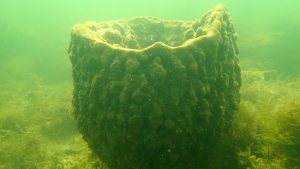The world’s oceans absorb about 30% of carbon dioxide in the atmosphere, which does not bode well for Florida’s 825 miles of coastline.
Carbon dioxide can contribute to ocean acidification — a reduction in the pH of the ocean — which puts some forms of marine life such as oysters, clams, sea urchins and corals in peril.

In a series of Ask IFAS documents, University of Florida experts explain how seawater chemistry changes as a result of elevated carbon dioxide levels. UF/IFAS Extension agents and scientists also outline how acidification can harm Florida’s marine life.
“Ocean acidification is an invisible, but real threat to Florida’s coastal and marine ecosystems, the impacts of which often amplify other threats such as water pollution, increased water temperatures and diseases or pathogens,” said Lisa Krimsky, water resources regional specialized Extension agent for Southeast Florida.
“However, it’s important to note that ocean acidification is not likely to impact all marine habitats and organisms in the same way,” said Krimsky, also a Florida Sea Grant agent. “Understanding these differences is necessary for successful management, protection and restoration of coastal and marine ecosystems.”
Marine habitats such as Florida’s coral reef are valuable, ecologically and economically. The reef supports fish and shoreline protection.
It’s also essential to the ecotourism industry. According to the Florida Keys National Marine Sanctuary, coral reefs in southeast Florida have a total economic value of about $8.5 billion. The estimated commercial value of fisheries with coral reef systems is over $100 million.
Therefore, UF/IFAS experts say it’s imperative to consider the effects of ocean acidification on sponges and stony corals because the interaction between these two groups may be altered.
In the most recent Ask IFAS document on ocean acidification, UF/IFAS scientists and Extension agents outline the potential danger it can inflict on sponges.
Early data suggest calcareous and siliceous sponges may be resistant or at least less susceptible to decreasing pH. But the data are incomplete, said Josh Patterson, a UF/IFAS associate professor of restoration aquaculture at the Florida Aquarium in Apollo Beach and Florida Sea Grant-affiliated faculty.
“There is not a lot of data available on how ocean acidification might affect sponges, but the information we have suggests they may be less affected than other forms of marine life with whom they compete for space and resources,” Patterson said.
But that doesn’t attenuate his concern for the potential damage ocean acidification could cause to sponges or the overall marine ecosystem.
When carbon dioxide mixes with water, it forms a weak chemical called carbonic acid. So much carbon dioxide has been emitted by human activity that it has decreased the pH of the oceans, and the trend will continue with further emissions, said Patterson, a faculty member in the School of Forest, Fisheries, and Geomatics Sciences.
There’s only one thing to do to lower ocean acidification, he said.
“The primary call to action is to decrease carbon dioxide emissions,” Patterson said. “We restore corals and sponges, but I don’t believe that action addresses ocean acidification.”
###
ABOUT UF/IFAS
The mission of the University of Florida Institute of Food and Agricultural Sciences (UF/IFAS) is to develop knowledge relevant to agricultural, human and natural resources and to make that knowledge available to sustain and enhance the quality of human life. With more than a dozen research facilities, 67 county Extension offices, and award-winning students and faculty in the UF College of Agricultural and Life Sciences, UF/IFAS brings science-based solutions to the state’s agricultural and natural resources industries, and all Florida residents.
The Florida Sea Grant program, hosted at UF/IFAS, is a university-based program that supports research, education and Extension to conserve coastal resources and enhance economic opportunities for the people of Florida. In addition to UF/IFAS, the program is a partnership between Florida universities, the National Oceanic and Atmospheric Administration and county governments.
flseagrant.org | @FloridaSeaGrant
 1
1
